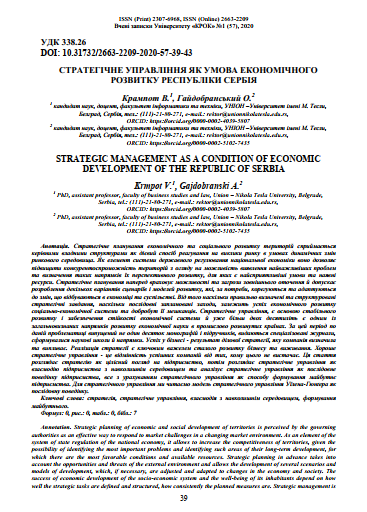STRATEGIC MANAGEMENT AS A CONDITION OF ECONOMIC DEVELOPMENT OF THE REPUBLIC OF SERBIA
DOI:
https://doi.org/10.31732/2663-2209-2020-57-39-43Keywords:
strategy, strategic management, interaction with the environment, shaping the futureAbstract
Strategic planning of economic and social development of territories is perceived by the governing authorities as an effective way to respond to market challenges in a changing market environment. As an element of the system of state regulation of the national economy, it allows to increase the competitiveness of territories, given the possibility of identifying the most important problems and identifying such areas of their long-term development, for which there are the most favorable conditions and available resources. Strategic planning in advance takes into account the opportunities and threats of the external environment and allows the development of several scenarios and models of development, which, if necessary, are adjusted and adapted to changes in the economy and society. The success of economic development of the socio-economic system and the well-being of its inhabitants depend on how well the strategic tasks are defined and structured, how consistently the planned measures are. Strategic management is the basis for stable development and ensuring the stability of the economic system and for more than two decades has been one of the generally recognized areas of economic science development in industrialized countries. During this period, more than a dozen monographs and textbooks have been published on this issue, specialized journals have been published, and scientific schools and fields have been formed. Business success is the result of a business strategy that the company has defined and follows. The implementation of the strategy is a key lever for sustainable business development and survival. Good strategic management is the difference between successful companies and those who lack that success. This paper views strategy as a holistic view of the enterprise, then deals with strategic management as an interaction of the enterprise with the environment and analyzes strategic management as consistent behavior of the enterprise, all in the light of strategic management as a way to shape the future of the enterprise. For strategic management, we cite Wheelen-Hunger's model of strategic management as consistent behavior.
Downloads
References
Thompson, A. and Strickland, A. J. (2015), Strateški menadžment: U potrazi za konkurentstkom prednošću. Zagreb: Mate d.o.o., p. 34.
Mencer, I. (2012), Strateški menadžment: Upravljanje razvojem poduzeća. Zagreb: TEB Poslovno savjetovanje d.o.o., p. 56.
Lasserre, P. (2012), Global Strategic Management. London: Palgrave MacMilan, p. 82.
Krmpot, V. (2016), Uticaj tendencija razvoja multiplarnog sveta na privredni razvoj Srbije, Doktorska disertacija, Fakultet za poslovne studije i pravo, Beograd, pp 111-112.
Freeman, R. E. (2012), Strategic Management: A Stakeholder Approach. Cambridge: Cambridge Univesity Press, p. 242.
Krmpot, V. (2014), Change Management. International Conference “Application of new technologies in management”, ANTIM, April 2014. Proceedings, p 125
Hitt, M. A. (2016), Strategic Management: Competitiveness & Globalization. Melbourne: Cengage Learning Australia, p. 78.


